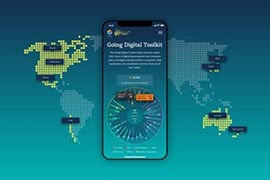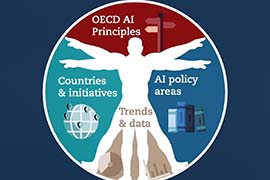Digital
What's new?
- OECD Declaration on a trusted, sustainable and inclusive digital future
- Safeguarding privacy in law enforcement and national security data access
- OECD policy framework on digital security: Cybersecurity for prosperity
- Going Digital to advance data governance for growth and well-being
- Going Digital guide to data governance policy making
- OECD Digital Economy Ministerial, 13-15 December 2022
- Measuring the environmental impact of artificial intelligence
Going Digital
The OECD Going Digital Project aims to help policy makers better understand the digital transformation and develop appropriate policies to help shape a positive digital future.
Toolkit
Is your country going digital or falling behind? The OECD Going Digital Toolkit includes indicators, policy guidance and related publications to help countries compare their digital development and realise the promises of digital transformation for all.
AI Principles
The OECD Principles on Artificial Intelligence promote AI that is innovative and trustworthy and that respects human rights and democratic values. They are the first such principles signed up to by governments.
OECD.AI
The OECD.AI Policy Observatory is a unique source of real-time information, analysis and dialogue designed to shape and share policies on artificial intelligence across the globe.
Children in the digital environment
As children spend more and more time online, how can governments can take action to ensure a safe and beneficial digital environment for them?
The OECD Recommendation on Children in the Digital Environment aims to help countries find a balance between promoting the opportunities and benefits that the digital world provides children while protecting them from online risks.
Online privacy
For decades the OECD has been playing an important role in promoting respect for privacy as a fundamental value and a condition for the free flow of personal data across borders.
The OECD Guidelines on the Protection of Privacy and Transborder Flows of Personal Data are the cornerstone of OECD work on information security and privacy.
Fibre has overtaken cable as the primary fixed broadband technology in OECD countries
In 2021 high-speed fibre Internet subscriptions rose by over 18% in OECD countries, making fibre the primary fixed broadband technology (34.9% of subscriptions) over cable (32.4%) and DSL (27% and declining). The biggest growth in fibre was in Costa Rica, Israel, Greece and Belgium, which all increased fibre connections by more than 80%.












